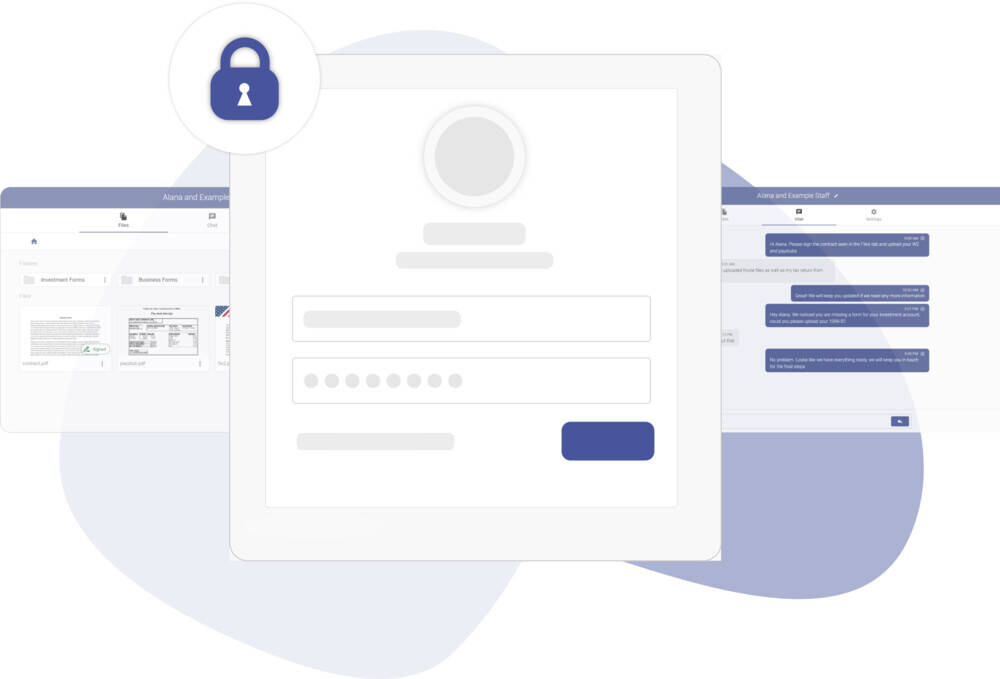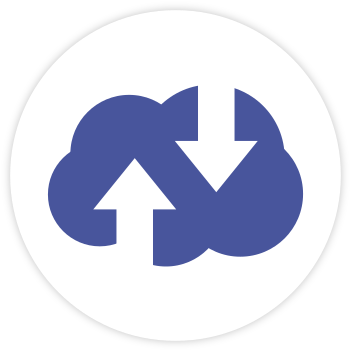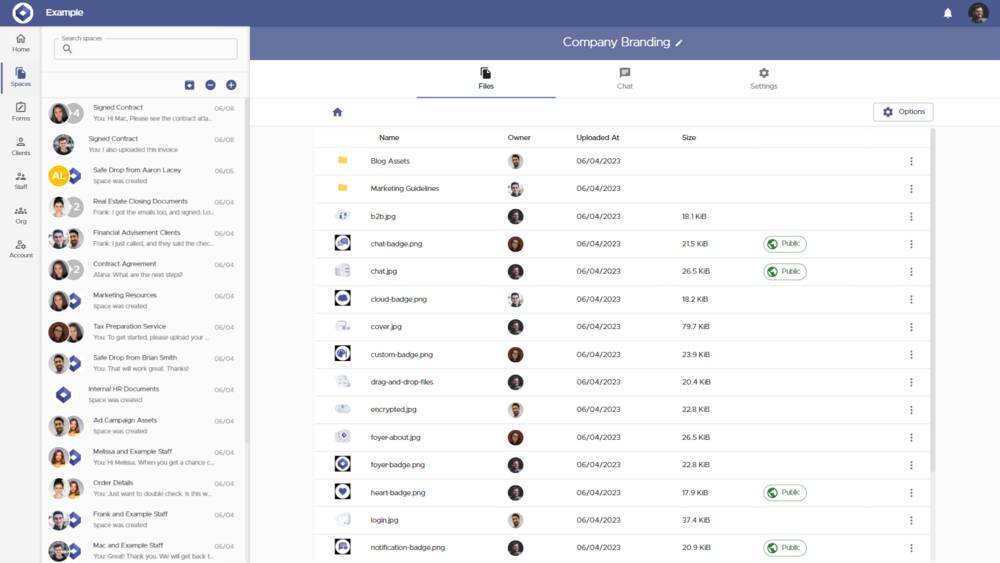Cloud-Based Client Portal
Set up a cloud-based client portal to securely share documents, communicate with clients, and manage projects from anywhere, all with no need for complex infrastructure.

Why choose a cloud-based client portal?
A cloud-based client portal offers a secure and accessible solution for managing client interactions. With a client cloud portal, your data is hosted in the cloud, giving your clients 24/7 access to files, communications, and updates from any device. Unlike on-premise solutions, a client portal cloud service is quick to deploy, scalable, and cost-effective, ensuring that you can easily adapt as your business grows.
All-in-one cloud solution, accessible anywhere.

Secure File Sharing
Quick and simple file sharing to enable your clients to securely upload and download files.

Real-time Messenger
Communicate with your clients effectively using your own real-time messenger.

Custom Branding
Build up your brand by customizing your portal using your own colors and logos.

Secured with Encryption
All files, messages, and user data is encrypted in transit and at rest with bank-grade encryption.

The Best Price
Foyer is affordable with our standard plan being just $19 per month per internal user.

Sign Files
Get your client's signatures quickly using DocuSign, the industry-leading eSignature solution.

Email Notifications
Get notifications via email for file uploads and unread messages so you never miss any client activity.

Folder Organization
Organize your client's files in folders using an easy-to-use interface. Just drag and drop.
Frequently Asked Questions
How do I create a cloud-based client portal for my business?
Setting up a cloud-based client portal for your business is simple and can be done quickly without extensive technical knowledge. Client portal services like Foyer make it easy to create a fully functional client portal in just 1 minute. With Foyer, you can access features like cloud-based document storage, secure messaging, emails, e-signatures, and more, all integrated into one platform. This allows you to manage client interactions efficiently while ensuring that all communications and documents are securely stored and accessible from anywhere.
How does a cloud-based client portal differ from an on-premises client portal?
A cloud-based client portal is hosted on external servers managed by a third-party provider, allowing businesses to access it over the internet without needing their own hardware or infrastructure. In contrast, an on-premises client portal is hosted on your company's local servers, meaning you have complete control over the environment but must handle all maintenance, security, and upgrades internally. Cloud portals offer easier accessibility, while on-premises solutions give you more control over customization and security management.
What are the cost differences between cloud-based and on-premises client portals?
Cloud-based client portals generally have lower upfront costs since you don’t need to invest in hardware or a dedicated IT team for maintenance. With a cloud solution, you typically pay for a subscription based on usage, such as storage capacity or the number of users. On-premises portals, on the other hand, require significant upfront investments in servers, data centers, and IT staff to manage the infrastructure. Additionally, scaling an on-premises solution means purchasing more hardware, whereas cloud portals allow for instant scalability with predictable monthly fees.
Which is more flexible, a cloud-based or on-premises client portal?
Cloud-based client portals offer unparalleled flexibility, allowing employees and clients to access the portal from any device with internet connectivity, regardless of their physical location. This flexibility is especially beneficial for remote teams or global businesses that need 24/7 access. On-premises portals are typically accessible only within the local network, unless remote users connect via VPN or other secure methods. This makes cloud portals more adaptable to modern, distributed workforces while on-premises systems can be more rigid in terms of access.
What are the storage limitations in a cloud-based client portal compared to on-premises?
Cloud-based client portals offer virtually unlimited storage that grows with your business needs. Since they operate in the cloud, you can easily expand your storage without purchasing additional hardware. Many providers offer pay-as-you-go storage models, making it easy to manage costs. In contrast, on-premises portals are limited by the physical storage capacity of your company’s servers. Expanding storage on-premises involves purchasing new hardware, setting it up, and ensuring that your network can handle the additional load, which is time-consuming and expensive.
How does maintenance differ between cloud-based and on-premises client portals?
Cloud-based client portals are maintained by the service provider, meaning that the vendor takes care of updates, security patches, server management, and backups, all of which happen in the background with no disruption to service. This is ideal for businesses that lack dedicated IT resources. On the other hand, on-premises portals require your internal IT team to handle all aspects of server maintenance, including software updates, security monitoring, and hardware repairs or upgrades. This adds significant overhead to managing an on-premises solution.
Is data more secure in a cloud-based or on-premises client portal?
Both cloud-based and on-premises client portals can offer high levels of security, but cloud providers typically invest in top-tier security infrastructure, including encryption, multi-factor authentication, and 24/7 monitoring. Cloud vendors are often subject to rigorous compliance certifications such as SOC 2, ISO 27001, and HIPAA, ensuring that they meet the latest security standards. On-premises solutions give you full control over security, allowing for custom configurations, but this also means that your IT team must stay on top of security threats, patches, and compliance regulations, which can be a significant burden if not managed properly.
Which is faster to deploy, a cloud-based or on-premises client portal?
Cloud-based client portals are much faster to deploy because they don’t require any hardware setup or on-site configuration. Most cloud solutions can be up and running in a matter of hours or days, with businesses simply signing up, configuring user access, and uploading data. On-premises client portals, by contrast, can take weeks or even months to deploy. This involves purchasing hardware, configuring servers, installing software, and ensuring proper network connectivity. Additionally, on-premises deployments often require IT resources to manage the installation and integration process.
Learn more about our features
Secure File Sharing
Quickly and securely exchange files with your clients in your company's own custom branded client portal. All files are encrypted at rest and in transit. All you have to do is drag-and-drop.



